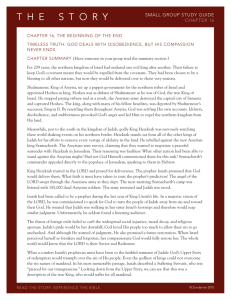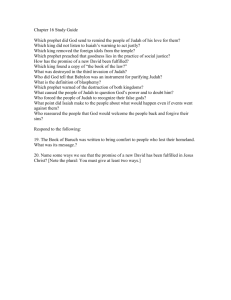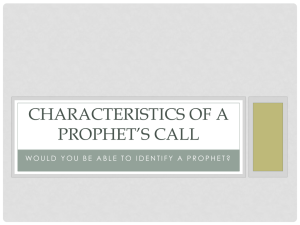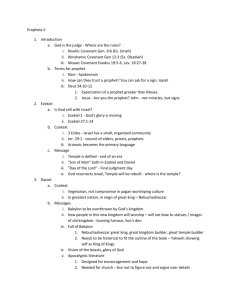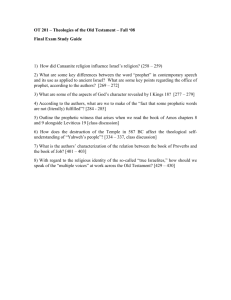PPT The Prophets
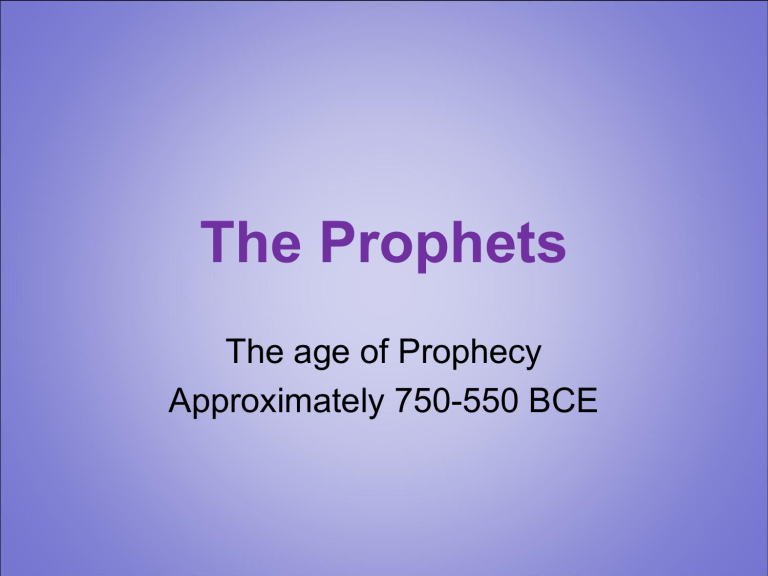
The Prophets
The age of Prophecy
Approximately 750-550 BCE
The three-part Hebrew Bible
The Law, Books of Moses, Pentateuch (Torah)
• Genesis, Exodus, Leviticus, Numbers, Deuteronomy
The prophets (Nevi’im)
• The former prophets: Joshua, Judges, 1&2 Samuel, 1&2 Kings
• The latter prophets: Isaiah, Jeremiah, Ezekiel, The scroll of the twelve (Amos, Hosea, Micah, Joel, Obadiah, Jonah, Nahum,
Habakkuk, Zephaniah, Haggai, Zechariah, Malachi)
The Writings (Kethuvim) (written after exile)
• Psalms, Job, Proverbs
• Ruth, Song of Songs (Song of Solomon), Ecclesiastes,
Lamentations, Esther
• Daniel, Ezra-Nehemiah, 1-2 Chronicles
Christian Old Testament
Pentateuch
Genesis
Exodus
Leviticus
Numbers
Deuteronomy
*Yellow text designates books in the Roman Catholic and Greek Orthodox
Old Testament
Historical Books Poetry and
Wisdom
Joshua
Judges
Ruth
1 Samuel
2 Samuel
1 Kings
2 Kings
1 Chronicles
2 Chronicles
Ezra
Nehemiah
Tobias
Judith
Esther
1 Macabees
2 Macabees
Job
Psalms
Proverbs
Ecclesiastes
Song of Solomon
Wisdom of
Solomon
Sirach
Prophetic
Books
Isaiah
Jeremiah
Lamentations
Baruch
Ezekiel
Daniel (additions)
Hosea
Joel
Amos
Obadiah
Jonah
Micah
Nahum
Habakkuk
Zephaniah
Haggai
Zechariah
Malachi
What is a prophet?
• Prophet in Hebrew = navi ( pl nevi’im )“One who is called” or “one who announces”
• The prophet is a link between the people and god.
• This is a strong contrast to Canaanite practice of seeking help from mediums who call up the dead.
• Their responsibility is to know and announce God’s will in the immediate situation in a way that the original audience can understand and respond to.
• Their job is to bring people back to obedience to the
Torah, and failing that, to specify the punishment for their disobedience.
• There were some women prophets too (Miriam,
Deborah, Huldah, Noahdiah).
Prophetic themes
• God is righteous and demands that his people worship him exclusively. Unlike other ancient god’s, he is jealous.
• He cannot be expressed through material images and those who try become guilty of idolatry
• Demands for social justice. Israel’s god is a champion of the poor, powerless, and vulnerable.
• Prophets are baffled and outraged at the extent of people’s disobedience.
• Pre-exilic prophets emphasize doom, while later ones offer comfort and hope. Restoration.
Prophetic Drama
Isaiah : naked except for a loin cloth paraded through
Jerusalem to illustrate the city’s imminent humiliation and ruin.
Jeremiah : wore a yoke of wood, then a yoke of iron to symbolize the coming Babylonian oppression.
Ezekiel : Cooked food over human excrement to symbolize the unclean food the people will be forced to eat in exile and he lay tied up and mute for 190 days on one side & for 40 days on the other to symbolize the number of years Israel and Judah would be in exile.
• Such dramatic displays couldn’t help but draw attention and they still present strong images that beg for our attention.
Prophetic form
Poetry & narrative
• Much of the prophetic literature is written as poetry
– Does this mean that’s the way the prophets spoke?
– Or is it because that’s the way it was recorded? No one knows for sure.
• Continues with the same kinds of parallelism
(synonymous, antithetic, synthetic)
• Much simile and metaphor and allegory
• In the King James version, and many others, the poetry is not laid out in lines as poetry. This makes the reading more difficult.
• In later versions, poetry is written in lines that more easily expose the parallelism. Also there are spaces between oracles.
Oracles
• Prophetic writing is frequently incoherent. In other words, it’s easy to get lost and often impossible to link one section to the next.
• Much of the prophetic books are random collections of individual pronouncements called oracles .
• Prophets are typically shown to be looking around them and observing wrongdoing, then speaking out about it.
Five Kinds of oracles
1. Oracles denouncing bad religion (especially idolatry and superficial worship)
2. Oracles denouncing social injustice (taking advantage of the poor, dishonest weights and measures, bribes)
3. Oracles calling for repentance
4. Oracles announcing destruction
5. Oracles promising restoration
Timing
• The prophets responded to urgent political or ethical crises that troubled their people.
• Editors of Hebrew bible placed these writings after the Deuteronomic history because they effectively illustrate the reasons for Yahweh’s rejecting his covenant people.
• Time period: Centered on three main events
– Assyrian Crisis (750-700 BCE) (722 Israel’s defeat by Assyria)
– Babylonian Threat (612 Assyria fell)
– Postexilic readjustment (520 Cyrus allows remnant to return)
Kings of Israel (north) and Judah (South) after Solomon
BCE Kings of Judah
1. Rehoboam
900
2. Abijah
3. Asa
4. Jehoshaphat
850
5. Jehoram
6. Ahaziah
7. Queen Athaliah
800
8. Joash
9. Amaziah
10. Uzziah (Azariah)
750
11. Jotham
12. Ahaz
Kings of Israel
1. Jeroboam
2. Nadab
3. Baasha
4. Elah
5. Zimri
6. Omri
7. Ahab (the worst)
8. Ahaziah
9. Joram
10. Jehu (OK, but still not great)
11. Jehoahaz
12. Jehoash
13. Jeroboam II
14. Zechariah
15. Shallum, 16. Menahem
17. Pekahiah, 18. Pekah, 19. Hoshea
722 fall of Samaria to the Assyrians
Prophets
(Elijah Israel)
(Elisha Israel)
Joel Judah (maybe)
Jonah (to Nineveh) (approx)
Amos Israel,
Hosea Israel
Isaiah Judah (until Hezekiah)
Micah Judah (until Hezekiah)
725
13. HEZEKIAH (Best)
14. Manasseh
650
15. Amon
16. JOSIAH (Best)
17. Jehoahaz
600
18. Jehoiakim
19. Jehoiachin
20. Zedekiah
587 Fall of Jerusalem to Babylonians (Esther) (Ezra) (Nehemiah)
Nahum (to Nineveh) (approx)
Jeremiah Zephaniah, (exile)
Habakkuk (approx)
Ezekiel, Daniel
Obadiah (to Edom)
Haggai, Zechariah
Malachi
Assyrian Empire
Isaiah of Jerusalem
(1-39)
• A historical person. Counselor to three kings (Jotham, Ahaz,
Hezekiah)
• Assyria threatens to engulf tiny Judah.
• Advises Davidic kings to rely exclusively on Yahweh for deliverance
• 36-39 is a prose narrative describing Assyria’s failure
• The quality of Judah’s future depends upon the ruling classes’ willingness to show compassion and practice social justice
– If your are willing to obey,
You shall eat the good of the earth.
But if you persist in rebellion,
The sword will eat you instead. (1:19-20)
– God is willing to forgive, “though your sins are like scarlet, they shall be as white as snow” (1:18)
Jeremiah
• Jeremiah’s message through all of this was that
Babylon’s victory couldn’t be avoided since it was Yahweh’s judgment and that the people should submit to it.
• Suffered as a traitor
• Prepare for exile and pray for your captors
• 597-first deportation from Judah to Babylon (Ezekiel goes with them)
• 587-burning of temple and city and second deportation
• 582-third deportation
Ezekiel
Younger than Jeremiah.
Went to Babylon with first exiles
Bizarre and compelling images
A message of judgment and doom on Jerusalem and the temple.
Focuses on individual responsibility. This is a break from Mosaic tradition where children are punished for the sins of their parents.
1-24. Call of Ezekiel and judgment
25-33. Judgment against foreign nations
34-48. Israel’s rebirth
Second Isaiah
(40-55)
• An anonymous prophet speaks to Judean captives in
Babylon.
• Often called Deutero-Isaiah
• The time of judgment is past
• Cyrus of Persia is praised for saving them from Babylon.
• God will lead them in a new and glorious exodus back to their homeland.
• Israel is Yahweh’s servant, God’s vehicle to bring divine light to the Gentiles.
Third Isaiah
(56-66)
Oracles oriented toward impoverished colony of exiles resettled in Judah which is now under Persian rule
Offers further comfort of better times ahead
God is not limited to the temple. Not focused on rebuilding Israel’s physical glory as a nation
66:1
What house could you build for me, what place could you make for my rest?”
Appeal to post-exile Jews
1. Authoritative even after the original events
– Helps make sense of why the events happened.
– Helps to understand God. What does he really want?
– Helps understand the nature of the relationship between God and man.
2.
The prophecies often did NOT come true… yet.
– There are foretellings that had not yet been satisfied.
– Hope of a new Israel ruled by a descendant of David.
– A utopian vision had been promised.
3. Even events that were fulfilled could still be applied in new ways
– What was said about specific situations in the original contexts could be applied to later situations.
Appeal to Christians
1. The prophets were searched for passages to apply to Jesus.
2. Original context is not regarded.
3. Assumes the prophets spoke hidden meanings that they didn’t understand themselves.
4.
This is called typological reading and we’ll talk about it more next semester.
Appeal to modern times
1. Can be applied to crisis situations now.
2. The general message of destruction for evildoers after a period of purifying tribulation and rewards for the righteous has a neverending appeal. It is a future hope that all people can look forward to.
3. The certainty of a better future to come for people in a crime-ridden troublesome world is extremely satisfying.
“Swords to Plowshares”
(Isaiah 2:4)
This bronze statue promoting the slogan " Let Us Beat
Swords into Plowshares " was donated by the Soviet Union to the United Nations. It represents the human wish to end all wars by converting the weapons of death and destruction into peaceful and productive tools that are more beneficial to mankind.
